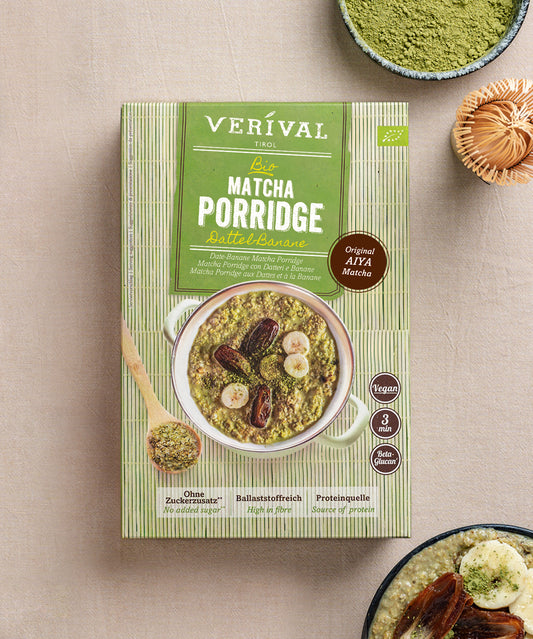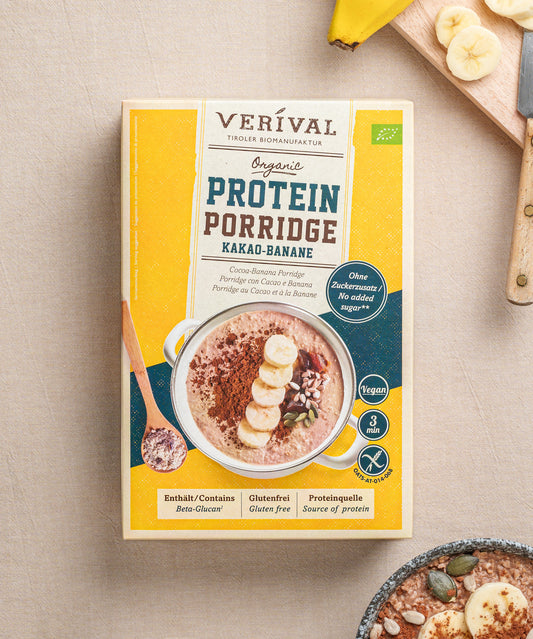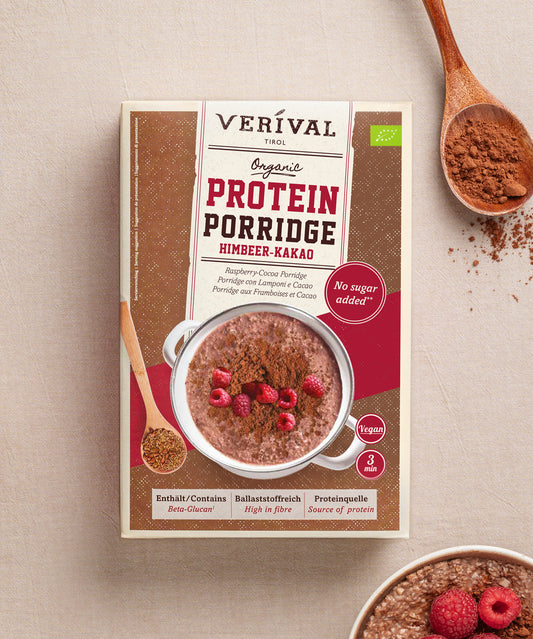Heartburn can ruin your day. It interferes with eating, burns in your throat and robs you of sleep. Millions of people struggle with it regularly – often without knowing that simple remedies can help. One of these is oatmeal. What may seem unremarkable at first glance can actually be a real game changer. Oatmeal is alkaline, rich in fibre and easy on the stomach. In this article, you will learn how heartburn develops, why diet plays a key role and how you can use oatmeal specifically to relieve the symptoms. Because with the right breakfast, you not only start the day better – you also give your body a chance to calm down.
Verival Porridge – the classic breakfast!
What is heartburn?
Heartburn is more than just an unpleasant burning sensation in the chest. It is a warning signal from your body that something is wrong. To understand why oatmeal can help, you need to know what heartburn actually is and how it manifests itself.
Symptoms of heartburn: more than just a burning sensation
A typical symptom is a burning sensation behind the breastbone, often rising up to the throat or pharynx. It can feel as if stomach acid is rising up into the oesophagus – which is exactly what is happening. Sometimes this is accompanied by a sour taste in the mouth or a feeling of pressure in the upper abdomen. Heartburn can also cause coughing, hoarseness or a lump in the throat. The symptoms occur particularly frequently after eating or when you lie down.
When do you talk about reflux?
Heartburn is the symptom, reflux is the cause. Reflux means backflow – in this case, stomach acid flows back into the oesophagus. This happens when the sphincter muscle at the junction between the stomach and the oesophagus no longer functions properly. Individual episodes of heartburn are harmless, but if it occurs regularly, it is referred to as gastroesophageal reflux disease (GERD). The good news is that you can do a lot to combat reflux through a targeted diet and a conscious lifestyle – and that's where oatmeal comes in.
How exactly does heartburn develop?
Heartburn occurs when stomach acid gets where it doesn't belong: in the oesophagus. The stomach produces acid to break down food – this is normal and necessary. Problems arise when the ‘valve mechanism’ between the stomach and the oesophagus does not close properly.
The sphincter muscle plays a central role
There is a small muscle at the junction between the stomach and the oesophagus: the lower oesophageal sphincter. Its job is to open only when food needs to reach the stomach – and then close again. If this muscle is too weak or is disrupted by pressure in the abdomen (for example, if you are overweight or after a heavy meal), stomach acid can rise upwards. This is exactly when the burning sensation in the chest occurs – heartburn.
Other triggers and aggravating factors
Other factors can also weaken the sphincter muscle or promote acid reflux. These include alcohol, nicotine, stress, tight clothing and certain medications. Eating late, high-fat meals and lying down frequently after eating also contribute to this. Important: Heartburn is not a question of age or gender – anyone can be affected. But you can take specific measures to counteract it, especially through your diet. This is where oatmeal comes in: it does not irritate the stomach, binds acid and helps to calm your digestive tract.
Heartburn as a disease – and what you can do about it
A one-off bout of heartburn after a greasy pizza or a glass of wine is no cause for concern. But if it occurs regularly, it can become serious. In this case, it is referred to as gastroesophageal reflux disease (GERD) – and it should not be taken lightly.
When does heartburn become a chronic condition?
If you suffer from heartburn several times a week, wake up at night because of it or the symptoms persist for weeks, then it is no longer just a case of short-term irritation. Over time, the acid attacks the mucous membrane of your oesophagus. If left untreated, this can lead to inflammation, damage to the mucous membrane or even an increased risk of cancer. That is why it is important to take action early on.
How to treat heartburn in the long term
The good news is that there is a lot you can do yourself. In addition to medications such as acid blockers (which should not be taken long-term), your lifestyle plays a major role. Diet, stress reduction, exercise and sleeping position make a big difference. It is particularly important to avoid irritating foods and choose foods that calm the stomach. Oatmeal falls into this category.
Which foods are good for reflux?
The right diet can work wonders for heartburn. It's not about giving up everything, but rather choosing foods that calm your stomach and bind excess acid. Many people notice a significant improvement after just a few days – simply because they are avoiding the wrong foods and eating the right ones.
Alkaline foods as a protective shield
Foods with an alkaline or neutral pH value counteract the acid in the stomach. They do not irritate the mucous membrane and support healthy digestion. These include, among others:
- Oatmeal
- Bananas
- Potatoes
- Carrots
- Rice
- Green leafy vegetables
- Zucchini
- Fennel
These foods help neutralise excess acid in the stomach. They do not cause fermentation or flatulence and are easy on the stomach. An alkaline meal is particularly beneficial in the morning – so you can start the day without heartburn.
Fibre and easily digestible foods
Fibre promotes digestion and prevents the stomach from spending too long processing food. Oatmeal is a real all-rounder in this respect. It swells in the stomach, binds excess acid and keeps you feeling full for longer without overloading your stomach. Cooked vegetables, low-fat dairy products and lightly steamed fish are also recommended. The aim is not to irritate the stomach – and you can achieve this with the right choice of foods.
Verival muesli with no added sugar – try it now
Foods to avoid if you suffer from heartburn
Some foods really fire up acid production in the stomach – and these are exactly the ones you should avoid if you want to get heartburn under control. It's not about giving up everything forever, but about recognising what's not good for you and when it's better to avoid certain things.
Acid boosters: what irritates your stomach
Highly acidic, fatty or spicy foods are particularly problematic. These include:
- Citrus fruits and juices (e.g. orange juice)
- Coffee, cola and energy drinks
- Alcohol, especially wine and beer
- Chocolate
- Tomatoes and tomato sauces
- Hot spices such as chilli, pepper or curry
- Fried and very fatty foods
These foods can either directly stimulate stomach acid production or weaken the sphincter between the stomach and oesophagus – both of which lead to reflux.
Timing and portion size also matter
It's not just what you eat, but also when you eat it. Large meals in the evening, late snacking and eating while lying down promote heartburn. It is better to eat several small meals throughout the day. And: stay upright after eating – for at least 30 minutes before lying down. This gives gravity a chance to keep stomach acid where it belongs.
Oatmeal – the all-round talent for heartburn
If you suffer from heartburn and are looking for a simple, effective and healthy solution, oatmeal is the right choice for you. This unassuming food scores highly in several areas and is perfect for everyday use – especially in the morning.
Why oatmeal is good for your stomach
Oatmeal is rich in soluble fibre, which swells in the stomach and binds excess stomach acid. At the same time, it forms a kind of protective mucous film in the gastrointestinal tract. This protects the sensitive stomach lining from irritation. In addition, the beta-glucans it contains promote digestion, lower cholesterol levels and keep you feeling full for longer – without overloading the stomach. Unlike white bread or sweet breakfast cereals, oatmeal ensures stable blood sugar levels and prevents acid peaks.
Alkaline, mild, versatile – and filling
Oatmeal is easy to digest and considered alkaline-forming – exactly what your body needs when suffering from heartburn. You can cook it in water or plant-based milk, combine it with stomach-friendly fruits such as bananas or apples, and turn it into a real power breakfast. It's also quick to prepare, easy to vary and can even be eaten on the go. No wonder they're at the top of the list for people with reflux.
Breakfast ideas with oatmeal for heartburn
A good breakfast can change your whole day – especially if you struggle with heartburn. Oatmeal provides the ideal basis for a stomach-friendly, filling and varied breakfast. Here are two simple but effective ideas that are good for your stomach.
1. Gentle banana and oat breakfast
Ingredients:
- 50 g soft oat flakes
- 200 ml oat or almond milk (unsweetened)
- 1 ripe banana
- 1 tsp flaxseed (ground)
Preparation:
Cook the oat flakes in the plant-based milk over a low heat until they are nice and soft. Slice the banana and add it just before the end – it will become slightly sweet and particularly easy to digest. Garnish with a teaspoon of flaxseed. This breakfast calms the stomach, keeps you feeling full for a long time and does not cause acid spikes.
2. Apple and cinnamon oat mix – warm and soothing
Ingredients:
- 50 g oat flakes
- 200 ml water or plant-based milk
- 1 mild apple (e.g. Gala)
- 1 pinch of cinnamon (use sparingly)
Preparation:
Peel and dice the apple. Heat it in a saucepan with the oatmeal and liquid. The apple will become soft, sweet and easy to digest. A small pinch of cinnamon rounds off the dish, but don't overdo it – too much spice can irritate the stomach. This breakfast provides fibre and vitamins and is easy on the stomach – ideal for an acid-free start to the day.
Porridge – the ideal breakfast for heartburn
Porridge is more than just a trend – it's a tried-and-tested, stomach-friendly dish that can effectively help with reflux and heartburn. Warm, soft, filling and adaptable – exactly what your digestive system needs in the morning.
Why a warm breakfast is better
Your stomach loves warmth and gentleness. Cold or highly processed foods in the morning stress the digestive system and can promote heartburn. Porridge, on the other hand, is cooked, easy to digest and has a calming effect on the stomach and oesophagus. The warm water or plant-based milk ensures that the oats swell up well and form a protective film in the digestive tract – exactly what you need when your stomach lining is irritated.
How to make the perfect porridge base
You don't need much: oatmeal, water or a mild plant-based milk, perhaps a few stomach-friendly ingredients such as banana, apple or a little rice malt for natural sweetness – and your basic porridge is ready. Important: no aggressive additives such as lemon juice, yoghurt or too many spices. Porridge is easy to prepare, can be stored in the fridge or even enjoyed cold – for example as overnight oats (although warm is usually better tolerated if you suffer from reflux). If you regularly experience heartburn, warm porridge should become a staple part of your breakfast.
High-fibre Verival breakfast – discover it here!
Conclusion: Oats for heartburn – simple, effective, healthy
Heartburn doesn't have to be a permanent problem. You can achieve a lot by making the right food choices – and oats are a real all-rounder. They calm the stomach, bind excess acid and provide valuable nutrients.
Especially as a warm breakfast in the form of porridge, they are ideal for a relaxed start to the day – without any burning sensation. If you regularly suffer from reflux, it is worth incorporating oatmeal into your diet. It is inexpensive, versatile, quick to prepare and easy on the stomach. Sometimes the solution to an unpleasant problem is closer than you think – right in your breakfast bowl.
























